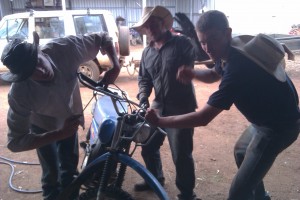
Sooooo, you applied and received your working holiday visa and now you’re headed to Australia, or maybe even Canada, in an effort to rustle up some work, hopefully well-paid. Well, good on you. Now, how can you ensure that you keep that well-paying job and, at the same time, increase your chances of getting another job? Below I discuss three “golden rules” given to me by my uncle when I worked on his farm.
First, understand that getting a job is not a right, it’s a privilege. Approaching any job with that mindset gives you the proper frame of mind for tackling any task you are asked to do and, more importantly, any mistakes that may occur. And there will be mistakes, it comes with the territory. Do your best to minimize them and, if you do make a mistake, take action right away.
Second, although I’ve written these rules with respect to working on a farm, they can be applied to just about any job out there.
Now for the three golden rules of working on a farm.
Rule #1: Don’t make work for the boss
This one is important because you, as a farm hand, are there to make life easier for your boss. If you break something, such as a fence post, angle grinder, or tractor, you’ve just made more work for your boss, not necessarily because he’s going to be the one to fix it (though often times he’ll have to), but because it delays greater work project. It’s true, there’s always work on the farm and that’s usually because something was broken and needs to be fixed. That being the case, when you mess up, don’t be afraid to confess. It’s better to say something earlier than wait for Mr. Boss Man to find out later on. Finally, if something does break, just remember that it is a farm and your boss didn’t become smart by not making mistakes. I’m sure if you asked those around him you’ll find out some of the things that your boss broke in his early days.
Rule #1a: Don’t make work for the boss’ wife
I received this one from my employer’s wife in Australia and it is equally as important as Rule #1. On some farms you might have someone make your meals for you and this should be seen as a privilege. It makes sense since you, as a farm hand, will be out in the middle of a field working and won’t have access or the time to make your own lunch. Treat this with respect. Further, after dinner, it’s not a bad idea to help clean up. Some folks will say you don’t have to but it doesn’t hurt to do a little more than expected than a little less.
Rule #2: Don’t run unless there’s fire
This rule, of course, should be taken in context. Things fall, animals charge, operators can’t see everywhere around the machine they’re driving, oil streams out of an engine, etc. There are times to hustle but, more often than not, running just adds risk. Although I try to follow this rule pretty closely, especially when rounding corners or with large machinery, some bosses will yell at you if it looks like you’re taking your time. Use your best judgment and be careful, but, please, unless it’s an emergency, don’t run.
Rule #3: When in doubt, stop and think
Oh the things that could be prevented if this rule was ingrained in the brains of any worker. “When in doubt, stop and think” is very important on the farm. You might be required to drive big machines that, with the slightest touch, can knock out power lines, fences, stake a cow (~$700 worth of hamburgers) or worse. If you don’t know if you can take the tractor through the gates (Australia has lots of gated paddocks but in Canada it depends what kind of farm you’re on), stop and think, “Can I make it through?” If not, consider your options. Bear in mind that if you don’t stop and think you might end up breaking Rule #1, which is don’t make work for the boss.
Bearing the above three rules in mind will greatly increase your success and make both your travels and work enjoyable. Good luck, have fun, and stay safe!